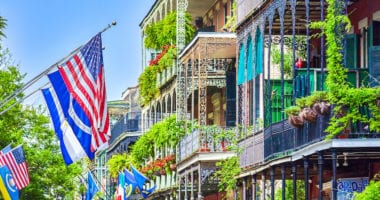PlayUSA Rewind: Louisiana Sports Betting Legalization Could Hit November Ballots

What a magical day May 24 became.
Four of the greatest athletes in their respective sports took to the links at Medalist Golf Club in Florida, pitting Tiger Woods and Peyton Manning against Phil Mickelson and Tom Brady.
Through a downpour, these GOATs persevered. Not just for bragging rights (which went to Tiger and Peyton). Not only for our own entertainment (with cart cams and live mics on each player). Not just to jumpstart legalized sports betting (which as gone without major sports since mid-March due to the coronavirus pandemic).
On the eve of Memorial Day, these greats came together for a good cause, raising over $20 million for COVID-19 efforts.
Despite terrible play
ing conditions, The Match 2 became a silver lining. And it signified, potentially, that the light at the end of the tunnel is getting closer.
Now, on to the Rewind:
Louisiana sports betting one step closer
Legalized sports betting in Louisiana appears close to hitting the November ballot, although one senator’s choice to include technical additions in the bill has delayed the bill’s passage in the House.
While legislation passed by a 73-23 vote, Speaker Pro Tempore Tanner Magee opted to include “participation in sports wagering … shall not be considered gambling by computer” in the bill. Such a choice would allow casinos to enter a bettor’s wager into a computer.
From here, the bill heads to the Senate, where a committee needs to sign off before sending it to the floor. The House expects to review details of a similar bill this week and could elect final passage, thus sending the bill to the November ballot.
Time is of the essence for Louisiana lawmakers, as the legislative session is scheduled to adjourn June 1.
Should parishes approve the legalization of sports betting, state lawmakers would craft additional details of the industry, such as regulations, next year.
Green-lighting regulated wagering in Louisiana would certainly provide a boost for casinos in the state, which already compete with properties in neighboring states that offer legalized sports betting.
Leagues still on hook for fighting legal sports betting
Two years later, and history again repeated itself.
The US Supreme Court ruled that it would not hear appeals over a Third Circuit ruling that major American sports leagues could owe restitution after the court struck down PASPA in 2018 and ultimately cleared the way for state-sanctioned sports betting.
Now the case moves to Third Circuit in New Jersey, where a decision could come down regarding how much leagues would owe the New Jersey Thoroughbred Horsemen’s Association, operators of Monmouth Park.
Initially, the association requested that the likes of MLB, NBA, NCAA, NFL and NHL use their $3.4 million in bonds to cover a temporary restraining order. And on top of that: an additional $150 million in damages.
Those five leagues stood as the main opponents of New Jersey regulators attempting to legalize sports betting in 2014. And Monmouth was ready to become the first property with a sportsbook.
The horsemen’s association noted that leagues were already landing deals with daily fantasy sports operators at the time, a grey area for many that shades closer to gambling as players could win money based on sports.
Eventually, four years after the fact, Monmouth did become the first location in the Garden State to accept legal wagers. Yet the fight for more continues.
New casino on the way to Chicago
For years, lawmakers and stakeholders have laid the path to potentially bring a casino to Chicago.
Now, it seems one is on the way.
The Illinois General Assembly worked late into the night last week to sign off on a $41 billion budget plan that relies on borrowing money and potentially receives help from the federal government amid the coronavirus pandemic. Amid all this, the Illinois Senate approved the casino plan by a 42-14 vote.
Now it awaits approval from Gov. J.B. Pritzker.
Sen. Bill Cunningham estimated that Illinois capital programs will receive $45 million in licensing fees before the casino even opens. To boot, Illinois would also receive $700 million in “a re-worked reconciliation fee.”
When the casino does open, revenue will help fund pensions for Chicago’s police and fire employees.










